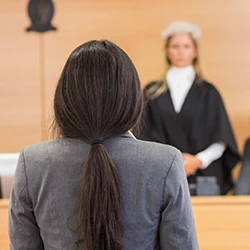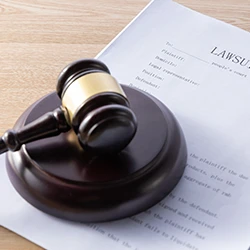An arraignment hearing marks the beginning of the defendant's journey through the justice system. It is essential for various reasons, but most importantly, it allows the defendant to be notified of the felony charges brought against him, and the court will decide whether or not a bail bond should be offered.
If this is your first time in court, you may feel overwhelmed and unsure of what to expect at your arraignment hearing.
Our team of expert attorneys at Schmidt & Clark, LLP, can guide you and prepare your defense.
Quick Summary
- The arraignment hearing is the first court appearance you will make. The prosecutor will let the defendants know the criminal charges filed against them. They will also be asked to plead guilty or not guilty to the charges.
- Make sure not to miss your arraignment hearing - having your lawyer appear on your behalf is not possible if charges have been laid against you.
- When considering whether or not to reduce bail at arraignment, it is important to review the best options before entering a courtroom to have the most convincing argument possible.
What Is An Arraignment?

This is when they receive their charges and enter a plea, such as guilty or not guilty.
In most states, the arraignment will occur in a district court shortly after the defendant has been arrested and charged.
During the hearing, four parties are normally present: the defendant, the judge, the attorney, and the prosecuting attorney or the district attorney.
The judge will read out the charges; after that, the defendant is asked to enter their plea.
Depending on the response, additional discussions may ensue regarding legal representation, payment of bail, or any other issues relevant to the case.
Individuals can determine what course of action they wish to take regarding their defense by attending an arraignment.
What Happens At Arraignment Hearings In Felony Cases?

- the right to a speedy trial
- the right to be represented by a lawye
- the right to call and confront witnesses.
At a felony arraignment hearing, the defendant must enter a plea, typically either guilty, not guilty, or no contest.
Defendants may also have the option to request a deferred entry of judgment under California Penal Code 1000.
When faced with consequences for drug offenses, Californians are presented with an opportunity to have their criminal case dismissed.
California Penal Code 1000 provides a deferral program that grants offenders the chance to restart fresh if they can complete a drug treatment program.
Following this plea from the defendant, based on their criminal history or other factors, the court then decides whether to set bail for release until trial or, if applicable, modify existing bail.
Finally, the judge determines the dates for a preliminary hearing, pre-trial motions, and trial.
When Does A Felony Arraignment Occur?
A felony arraignment occurs either the same day or the day after a defendant is arrested and charged [1].
Any unreasonable delay of an arraignment violates the defendant’s right to a speedy trial.
During a felony arraignment, a judge will consider a defendant's eligibility for bail and decide on any motion that has been filed by either the defense or prosecution.
All in all, a felony arraignment provides a vital starting point in a very intricate legal process.
When Do I Enter A Plea?

When you enter a plea, you are telling the court you are either guilty or not guilty of the offense you have been accused of.
If you refuse to enter any plea or fail to appear in court, a "Not guilty" request will be entered for you.
Understandably, entering a plea is a major decision and should not be taken lightly.
As such, it is important to speak with your lawyer first and make sure you understand how it could affect your case.
Related Article: How Long It Take To Get a Court Date for a Felony?
Setting Conditions Of Bail Or Pretrial Release At Arraignment
Depending on the jurisdiction, an arraignment may also involve setting conditions of release to ensure the defendant shows up to court proceedings.
“Judges set release conditions at arraignments. Some of these conditions are simple: don’t drink, show up to all your court dates, or stay away from someone. Sometimes conditions of release are not so simple: post bail, stay away from your children or family, or turn in your passport.”- Robert Rhodes, Legal Practitioner at Rhodes Legal Group
Defendants may have multiple options to remain free while awaiting their trial.
Release on recognizance allows defendants to be released from custody without any financial penalty; release on bail or bond calls for a payment in exchange for the defendant’s release from custody.
Sometimes, courts opt for supervised pretrial release as an alternative to jail time [2]. Various restrictions include home confinement, travel limit, and drug testing during supervised pretrial release.
Should I Have A Lawyer At The Arraignment Hearing?

A lawyer can make the difference between a successful and unsuccessful arraignment hearing.
Having an experienced lawyer making legal arguments on your behalf means you are more likely to emerge from the hearing with positive outcomes.
This is especially true if there is a dispute over the facts of the case or if you plan to plead not guilty.
A lawyer can help minimize the potential consequences and ensure the court’s ruling is fair.
Furthermore, they can explain all aspects of the arraignment, determine which plea is in your best interest, and negotiate any possible plea bargains or alternative resolutions in your favor.
Ultimately, having a skilled attorney at your side will provide valuable reassurance, peace of mind, and potentially better outcomes for someone facing an arraignment hearing.
Related Articles:
- Can Charges Be Dropped at an Arraignment?
- What Is a Preliminary Hearing?
- 5 Signs For Case To Be Dismissed
See all related personal injury and accident lawsuits our lawyers covered so far.
FAQs
1. Can My Lawyer Appear On My Behalf?
No, your lawyer cannot appear on your behalf. It is important to speak with your lawyer first and make sure you understand the process for an arraignment. But you have to appear personally; otherwise, the court may issue an arrest warrant against you.
2. Will The Judge Consider Reducing My Bail At The Arraignment?
Yes, the judge may consider reducing your bail at the arraignment. This can be requested through a motion before the court. If the accused has a reliable financial source and a viable plan to ensure they show up for future hearings, the judge is more likely to grant such a motion.
3. What Should I Bring To The Hearing?
You should bring all the necessary paperwork when attending your hearing. Make sure to bring any evidence that could aid in your defense, such as copies of police reports and any other paperwork you may have received regarding the complaint against you.
Get A Free Consultation With Our Criminal Defense Attorney
One of the most important things that will happen at an arraignment is that the conditions of release are argued with the prosecuting attorney.
If you have been charged with a felony offense, contact Schmidt & Clark, LLP for a free consultation with one of our experienced criminal defense attorneys.
We will review your case and help develop a solid defense to help you get the best possible outcome.
References:
- https://www.justice.gov/usao/justice-101/initial-hearing
- https://www.mass.gov/info-details/the-bail-process-arrest-to-arraignment

 Published by
Published by